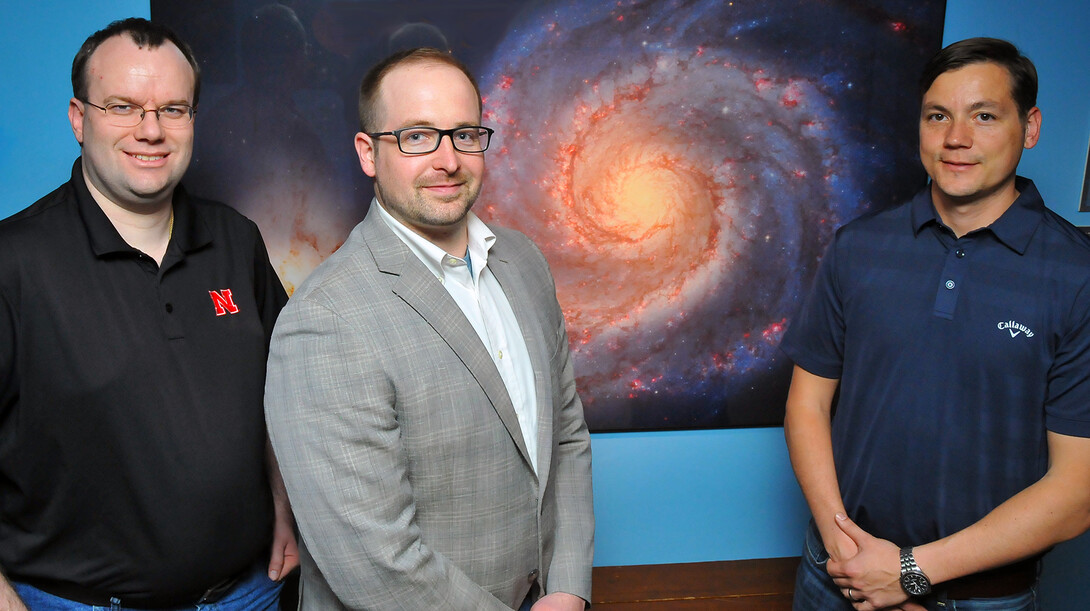
With a manned mission to Mars contemplated within the next 25 years, NASA is launching new research efforts to learn how lengthy space flight affects the human body and mind.
Last week, astronaut Scott Kelly departed for a year-long stay on the International Space Station. The mission’s key goal is to study how prolonged space flight affects the human body. Kelly’s twin brother, Mark, a retired astronaut, will serve as a baseline for comparison.
Meanwhile, a team of organizational psychology researchers from UNL, including management professor Fred Luthans and assistant professor of management Peter Harms, recently completed technical reports for NASA on how to select and train astronauts with the mental toughness to survive lengthy space flights.
“Increasing emphasis is being placed not only on selecting candidates with the ‘right stuff,’ but also on preflight training aimed at improving crew members’ ability to effectively manage the stress that will inevitably arise,” wrote lead author Adam J. Vanhove, a postdoctoral fellow in management.
NASA assigned the UNL team two tasks: to sum up existing research and to identify priorities for future research. NASA sought out the UNL researchers because Luthans is a nationally recognized expert in psychological capital, a way to evaluate mental wellbeing in the workplace. Luthans enlisted Harms; Mitchel Herian, a faculty fellow with the University of Nebraska Public Policy Center; and Vanhove because of their experience in studying wellbeing and mental resilience among military personnel. The team worked on the project from January to August 2014, with NASA publishing the resulting reports in February.
The UNL team called for additional study to develop and test measures of wellbeing specifically for space missions as well as other isolated, confined and extreme environments. They propose training programs to enhance wellbeing and resilience among crew members in space, mission control and crew members’ families.
The researchers examined previous studies of polar explorers, soldiers and submariners, simulated space expeditions — including the Mars 500 simulation where a six-person international team lived in isolation for 520 days in 2010-11 — and actual space flights, including Russian cosmonaut Valeri Polyakov’s 14-month stay on the Mir space station in 1995.
They also interviewed three current or retired astronauts, two NASA psychologists, a NASA flight surgeon, a NASA flight director, a NASA flight instructor, an Antarctic scientist, and a veteran of a long-term Arctic expedition.
They found relatively few findings about how psychological wellbeing and resilience affect explorers’ performance in isolated, confined and extreme environments. That’s because previous studies tended to look for signs of dysfunction, rather than positive psychological traits.
A manned trip to Mars poses dangers and challenges not previously faced by human explorers, the UNL researchers say. Not only would the trip’s length far exceed any previous missions, the crew would experience significant communication delays; endure lengthy periods of inactivity punctuated by crises, and they would lose sight of the Earth as they journey outside the Earth’s orbit toward Mars.
“The effects of these unique circumstances on crew members are currently unknown, but they will likely test individual limits like never before and the importance of maintaining psychosocial health and functioning to mission success is an issue that cannot be overstated,” Vanhove wrote.
NASA estimates it would take six months to travel to Mars and six months to return to Earth. Before making the return trip, however, Mars explorers likely would have to wait 18 months until the two planets returned to the right orbital positions.
Age, experience, social skills and a low need for affection are among the traits previous research has found among successful polar explorers and astronauts.
Conscientiousness and extroversion — typically traits for success in most workplaces — are less helpful in extreme environments. Conscientious people find it frustrating when they can’t complete tasks as expected. Extroverts dislike the limited social interaction.
In Mars 500, the longest Mars simulation to date, relatively few members of the crew successfully weathered their nearly 18-month stay in a capsule in Russia without experiencing some sort of physical or psychological problems, Harms said. For example, crew members suffered sleep problems and agitation to various degrees.
And in a 105-day simulation of an International Space Station flight in 1999, Vanhove reported, a physical fight broke out among crew members, sexual harassment was reported and one crew member withdrew from the study in protest. That’s an option that’s unavailable once in space.
“These are all people you would pick to go to Mars,” Harms said. “They didn’t completely lose control, but they weren’t flourishing. To me, it’s illustrative of how little we know and how hard this is going to be.”







